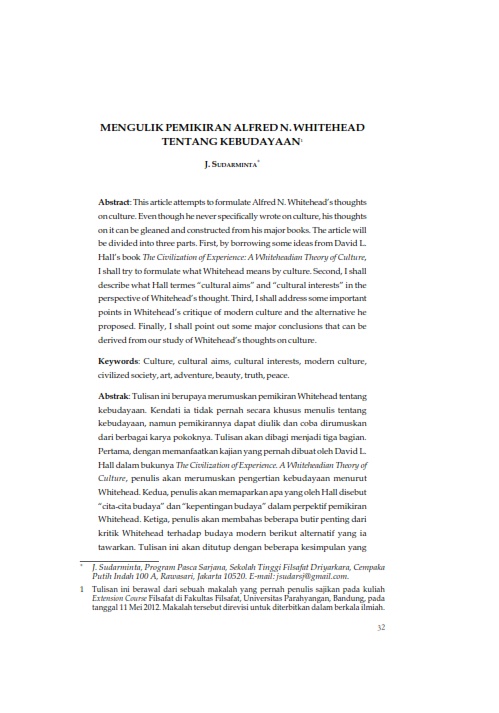Mengulik Pemikiran Alfred N. Whitehead Tentang Kebudayaan
Abstract
Abstract: This article attempts to formulate Alfred N. Whitehead’s thoughts on culture. Even though he never specifically wrote on culture, his thoughts on it can be gleaned and constructed from his major books. The article will be divided into three parts. First, by borrowing some ideas from David L. Hall’s book The Civilization of Experience: A Whiteheadian Theory of Culture, I shall try to formulate what Whitehead means by culture. Second, I shall describe what Hall termes “cultural aims” and “cultural interests” in the perspective of Whitehead’s thought. Third, I shall address some important points in Whitehead’s critique of modern culture and the alternative he proposed. Finally, I shall point out some major conclusions that can be derived from our study of Whitehead’s thoughts on culture.
Keywords: Culture, cultural aims, cultural interests, modern culture, civilized society, art, adventure, beauty, truth, peace.
Abstrak: Tulisan ini berupaya merumuskan pemikiran Whitehead tentang kebudayaan. Kendati ia tidak pernah secara khusus menulis tentang kebudayaan, namun pemikirannya dapat diulik dan coba dirumuskan dari berbagai karya pokoknya. Tulisan akan dibagi menjadi tiga bagian. Pertama, dengan memanfaatkan kajian yang pernah dibuat oleh David L. Hall dalam bukunya The Civilization of Experience. A Whiteheadian Theory of Culture, penulis akan merumuskan pengertian kebudayaan menurut Whitehead. Kedua, penulis akan memaparkan apa yang oleh Hall disebut “cita-cita budaya” dan “kepentingan budaya” dalam perpektif pemikiran Whitehead. Ketiga, penulis akan membahas beberapa butir penting dari kritik Whitehead terhadap budaya modern berikut alternatif yang ia tawarkan. Tulisan ini akan ditutup dengan beberapa kesimpulan yang dapat ditarik dari kajian mengenai pemikiran Whitehead tentang kebudayaan.
Kata-kata Kunci: Kebudayaan, cita-cita budaya, kepentingan budaya, budaya modern, masyarakat berkeadaban, seni, petualangan , keindahan, kebenaran, kedamaian.

DISKURSUS applies the Creative Commons license (CC BY). We allow readers to read, download, copy, distribute, print, search, or link to the full texts of its articles and allow readers to use them for any other lawful purpose. The author must be aware that the article copyrights will be fully transferred to DISKURSUS if the article is accepted to be published in the journal. Once the manuscript has been published, authors are allowed to use their published article under DISKURSUS copyrights. Full information about CC BY can be found here: https://creativecommons.org/licenses/by/4.0/












